Key takeaways:
- Genealogy research often encounters roadblocks due to missing records, conflicting information, and geographic barriers.
- Utilizing specialized software and online databases like Ancestry and FamilySearch can help organize findings and uncover new leads.
- Engaging with family stories and local communities can provide valuable insights and support when facing challenges.
- Persistence, patience, and the exploration of diverse sources beyond traditional records lead to meaningful discoveries in family history.
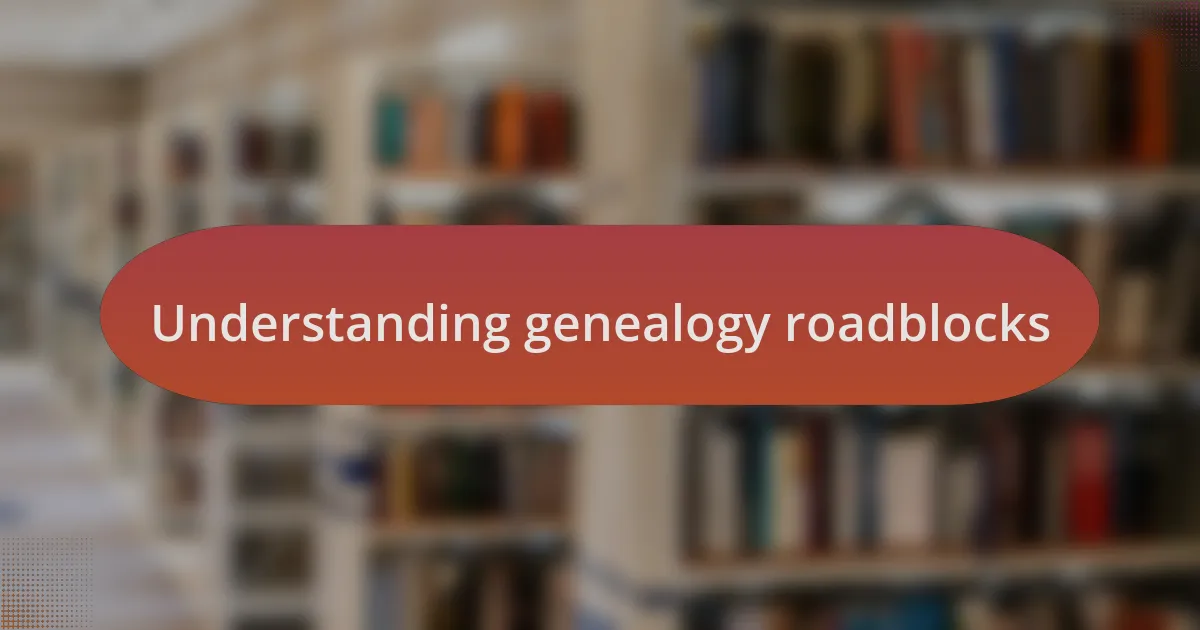
Understanding genealogy roadblocks
Genealogy roadblocks can feel like insurmountable walls, halting our quest for connection with our ancestors. I remember hitting a dead end with my great-grandfather’s disappearance after relocating to a new country. How could someone leave such a profound legacy and yet vanish from the records? It left me feeling frustrated and questioning my research skills, but I realized that these challenges often come with the territory.
Sometimes, it’s not just missing documents but conflicting information that adds to our dismay. Have you ever found two conflicting birth dates for the same ancestor? I certainly have, and I felt like I was grasping at straws trying to discern the truth. It’s a reminder of the complexities of human lives, where records are often imperfect, and stories can vary based on who tells them. Embracing this uncertainty can be difficult, but it can also fuel a deeper exploration into my family history.
Technology can be a double-edged sword in our genealogy journey. While I’ve utilized online databases to find records, I’ve also faced the challenge of sifting through inaccurate entries or transcriptions. I often wonder, how much of our history is tangled in these digital webspaces? It can be disheartening, yet it also sparks creativity as I’ve adapted my research strategies, realizing that sometimes the best leads come from local archives or oral histories rather than a simple search online.
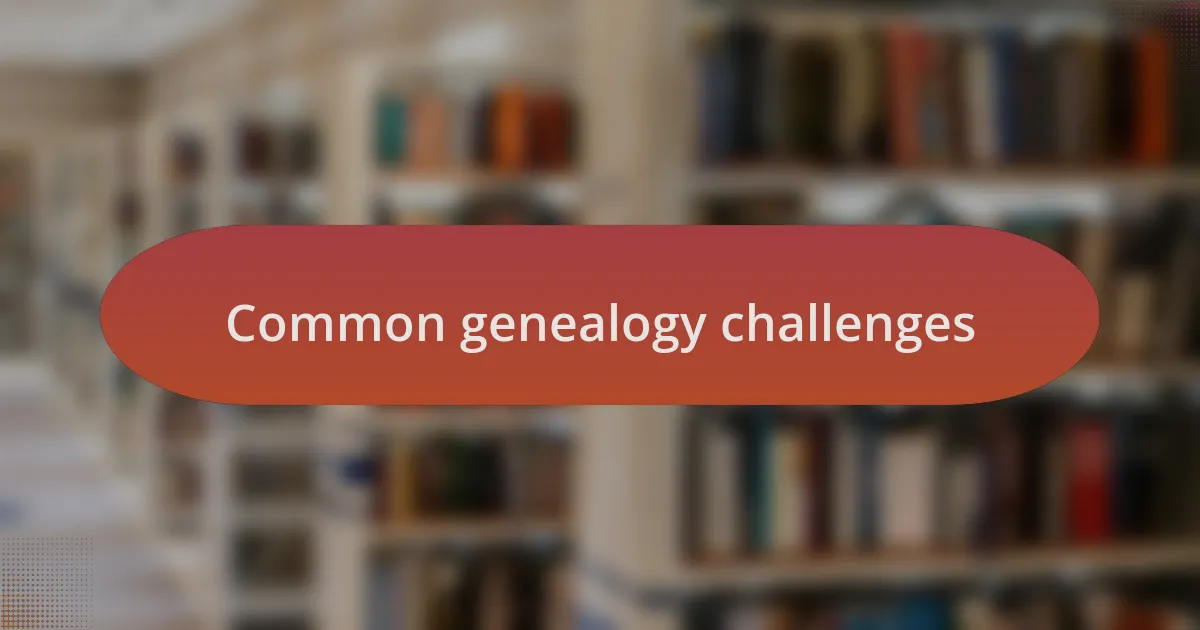
Common genealogy challenges
Genealogy challenges can often arise from an overabundance of options. I recall spending hours navigating through countless online family trees only to find that many of them contained unverified information. It’s like trying to find a needle in a haystack—what’s accurate and what’s merely conjecture? This overwhelming amount of data can lead to confusion and, at times, disillusionment.
Another common issue I faced was geographic barriers. When my great-grandmother’s roots traced back to a small village in Eastern Europe, I hit a wall. Language differences made accessing records daunting, and the lack of digitized archives felt like I was searching for a treasure that was never meant to be unearthed. Have you ever felt completely out of your depth in another country’s records? It was a pivotal moment that pushed me to seek help from local genealogists who understood the terrain better than I ever could.
Additionally, some roadblocks stem from the passage of time, which can erode connections to our ancestors. I remember finally obtaining my ancestor’s death certificate, only to find it filled with errors about family names and relationships. It left me grappling with the reality that, as years pass, so do the memories and accuracy of those who come before us. How do we piece together these fragmented stories? I learned that patience and a willingness to explore various sources can often illuminate hidden truths.
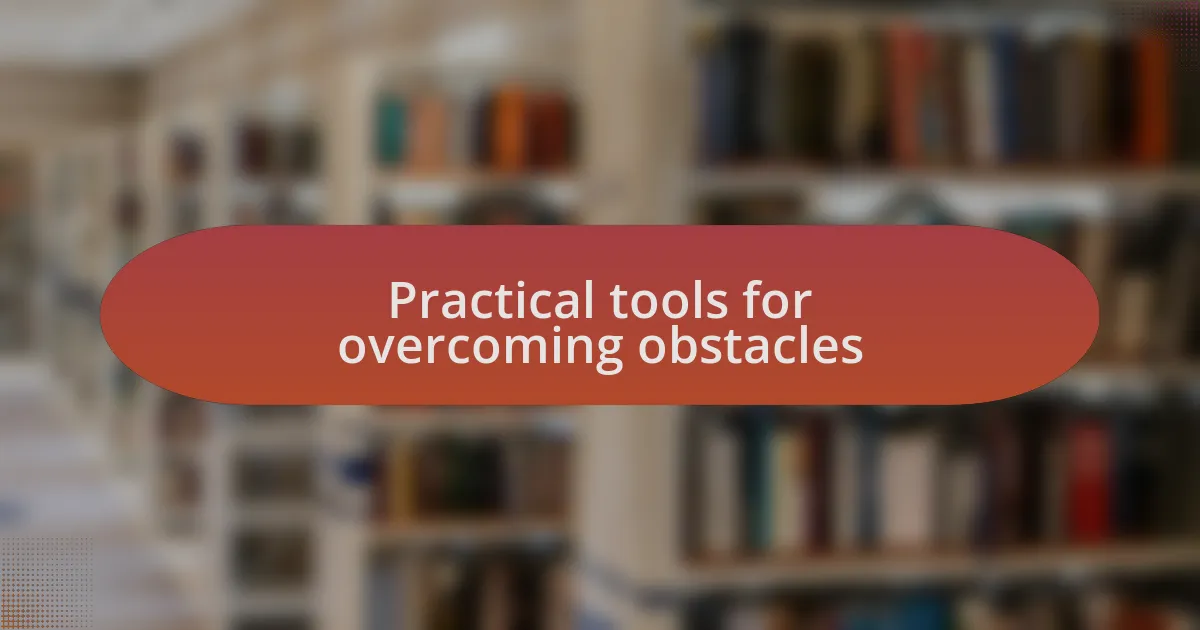
Practical tools for overcoming obstacles
Utilizing specialized software can be a game changer when tackling genealogy obstacles. I remember the first time I used a genealogy program to organize my findings; it felt like I was finally putting together a jigsaw puzzle that had been scattered all over the table. It helped me visually track connections, allowing me to see relationships or gaps that I might have overlooked before. Have you ever wished for a clearer perspective on your family tree? A good software can provide that clarity by simplifying complex relationships and highlighting potential leads for further research.
Online databases such as Ancestry and FamilySearch are invaluable resources for overcoming genealogical barriers. The sheer volume of transcription efforts means that you can often find records that are not available locally. One particularly enlightening evening, while exploring naturalization documents, I stumbled across a name I had never seen before—a distant cousin who had migrated alongside my great-grandfather. I felt like I had opened a new door to my family’s past. If you’ve found yourself stuck in your research, consider diving into these platforms—they often have tools like hints or recommendations that can reignite your search.
Joining local genealogy groups or online forums can also provide the support needed to push through challenging periods in your research. I vividly recall a meeting where an expert shared tips on reading old handwriting, which had been a significant stumbling block for me. The camaraderie and shared experiences reminded me that we’re all in this quest together. Have you thought about connecting with others who share your passion? Sharing triumphs and frustrations can lead to breakthroughs you never expected.
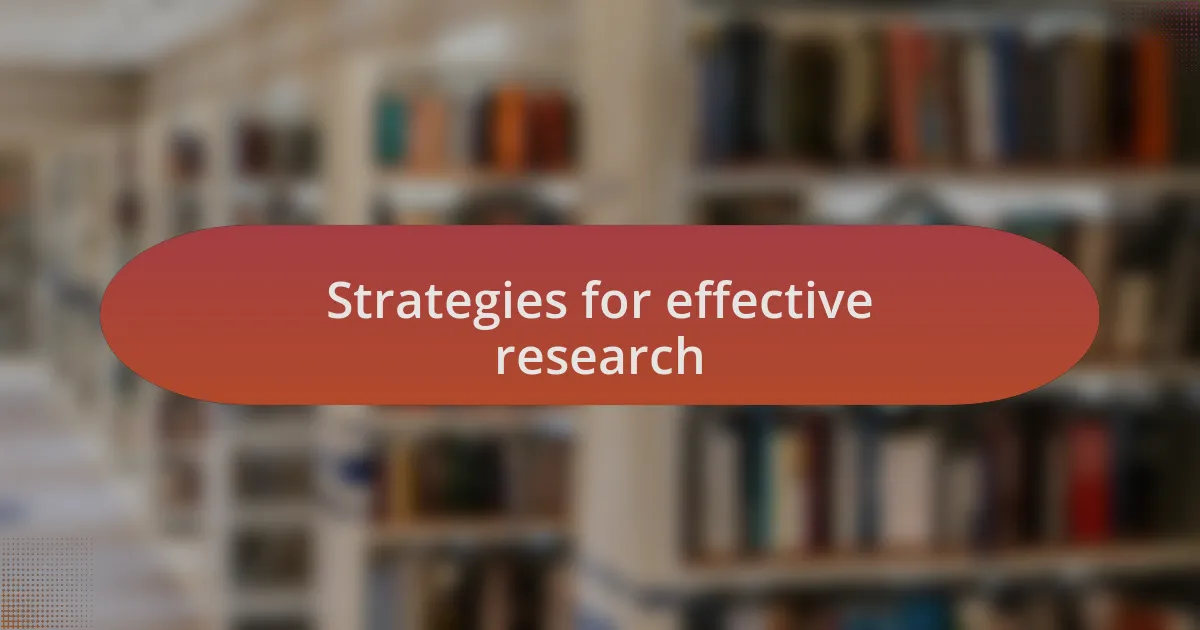
Strategies for effective research
One of the most effective strategies I’ve discovered is to set specific, achievable goals during my research sessions. Early on, I would often dive in without a clear plan, leading to frustration and burnout. I remember the day I decided to focus solely on one branch of my family tree for an afternoon. Not only did I dig deeper into that lineage, but I also uncovered valuable documents that connected generations in ways I hadn’t anticipated. Have you ever felt overwhelmed by the vastness of your research? Narrowing your focus can make the exploration feel more manageable and, ultimately, more rewarding.
Exploring diverse sources can also illuminate unexpected paths. I once felt boxed in by traditional records like census data and birth certificates. But when I began to explore local newspapers and personal letters, the narrative of my ancestors started to come alive. I found an obituary that revealed not only family members but also astonishing details about their lives, like their contributions to the community. Have you considered that everyday items in archives could shed light on your family’s story? This shift in approach allowed me to paint a more vivid picture of my heritage.
Networking with fellow genealogists has proven invaluable. I joined a virtual seminar where participants shared their own roadblocks and the creative ways they overcame them. One participant mentioned crowd-sourcing information from family members, which I’d previously overlooked. Inspired, I reached out to cousins I hadn’t spoken to in years. This not only refreshed my research but also rekindled family connections. Have you tapped into the potential of your extended family? Engaging with others can lead to unexpected discoveries that enrich your genealogical journey.
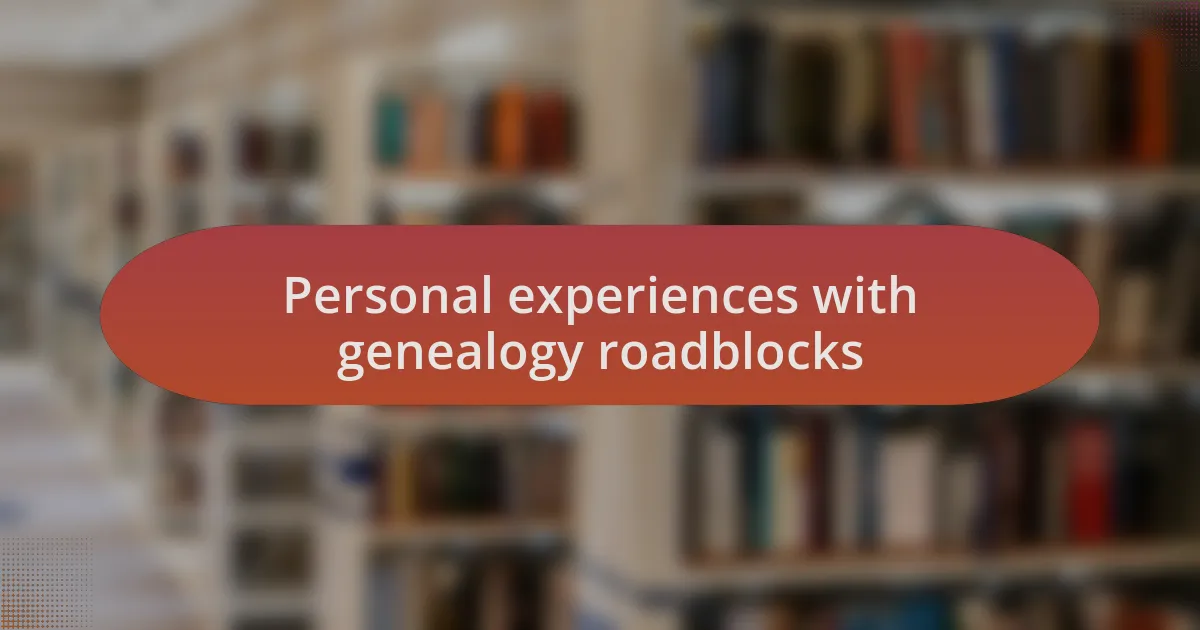
Personal experiences with genealogy roadblocks
I recall a time when I hit a major roadblock while tracing my grandmother’s lineage. I had gathered a wealth of information, but I found myself stuck at a particular ancestor whose origins were shrouded in mystery. Frustration lingered, and I almost gave up. But then, I decided to revisit the family stories I had brushed off. As I dug into the tales passed down through generations, I uncovered a nickname that led me to an unexpected town. Have you ever thought about how family lore can sometimes hold the key to unlocking genealogical puzzles?
Another memorable challenge was when I confronted conflicting information in public records. While trying to verify my great-grandfather’s military service, I came across different names, dates, and even places of birth. It felt like I was chasing a ghost! Instead of losing heart, I took a step back and sought alternative resources, like military context from historical societies. This process not only clarified the confusion but also gave me a deeper understanding of the era in which he lived. Isn’t it intriguing how sometimes, stepping away for a moment can lead to greater clarity?
I also faced a significant roadblock when trying to document my parents’ immigration story. The language barrier of old documents often left me puzzled until I sought help from online forums. It was heartening to find a community willing to assist, some even translating documents for me without hesitation. This experience opened my eyes to the power of collaboration in genealogy, reminding me that reaching out can transform isolation into connection. Have you found support in unexpected places while navigating your own research challenges?

Lessons learned from my journey
As I navigated my genealogy journey, I discovered that persistence is often my greatest ally. There were days when I combed through endless digital archives, only to uncover a thread that didn’t seem to lead anywhere. Yet, I learned not to dismiss any lead, no matter how small. One time, a seemingly irrelevant birth record turned out to be the key I needed, unraveling a complex family connection I had yet to uncover. Have you ever doubted a lead, only to find it was your missing piece?
Another lesson was the importance of digging deeper beyond the records. I remember poring over letters my great-aunt had written, filled with stories and details that a simple birth certificate could never reveal. These narratives provided a richer context for the names I was cataloging, transforming a list of dates into a vibrant family tapestry. Hasn’t your research sometimes taken unexpected turns when you explore those hidden narratives?
Through these encounters, I’ve come to appreciate the value of patience. There were times I wanted to rush through my research, eager to see results. Yet, I found that allowing myself the time to reflect often led to incredible breakthroughs. For instance, taking a week away from the project allowed me to return with fresh eyes and new ideas. Isn’t it fascinating how a little space can lead us to insights we might have overlooked in the rush to find answers?